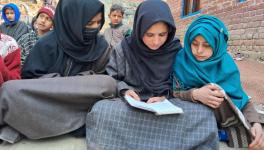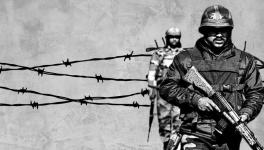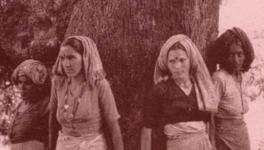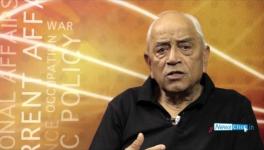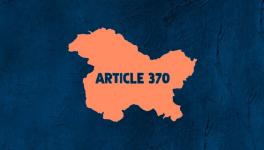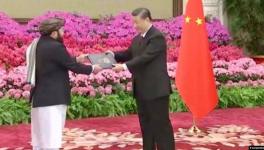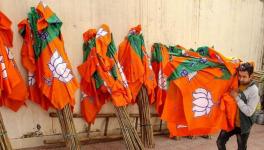Kashmir: An Unfolding Tragedy
Gautam Navlakha discusses how the current crisis in Kashmir is an unfolding tragedy.
Rough Transcript:
Pranjal: Hello and welcome to newsclick. Today we are going to discuss about the recent situation in Kashmir. To discuss the issue, we have with us eminent human rights activist, Gautam Navlakha. Hello Gautam, welcome to Newsclick. So we’ve seen in Kashmir, around more than 30 people are dead and many more injured. How do you see the situation today?
Gautam Navlakha (Gautam): There are two aspects to the situation. Following the killing of Burhan Muzaffar Wani, the mass outpouring of grief and anger also saw police firing bullets, pellets and all. 32 people have died, more than1538 injured, of them more than hundred have lost their eyesight due to pellet injuries and this is a repeat of what happened in 2008 and subsequently. So that is one part of it, but what is happening is a tragedy that is taking place right before our eyes. What we are witnessing is actually a tragedy unfold, where the people have been forced, I believe by circumstances that have driven them to this point.
Pranjal: So that is where we actually need to come, that what are the reasons for it. Since 2008, it looked like the things are getting normal. But over the past few months, things have changed drastically.
Gautam: 2008 was a watershed in Kashmir’s contemporary history in the sense that, that was a moment when mass upsurge saw militancy withdraw. And militancy started declining; I mean the rapid decline of militancy took place at the moment when people came out on the streets in mass agitation. That was a moment that offered us an opportunity. We let it pass by simply trying to crush it and once having crushed it, and so-called ‘calm’ was restored. We believed that things are hunky-dory. And this was repeated in 2009, 2010, 2011, 2012, 2013, and then in 2014 you have the massive floods in Kashmir. The way in which the local population had to come out and fend for themselves, following which two-year apathy was shown by the government of India in providing relief and rehabilitation to people. So, a lot of things have happened in Kashmir and not just in the last two, three months. Last two, three months are a reflection and a product of what has been happening in Kashmir right from the beginning. And we have to ask ourselves this question. We’ve gone to war and fought wars with Pakistan; it hasn’t ended the Kashmir dispute. We have had military suppression from 89-90 and we now see, once again, we are witnessing that there is mass support for demand for azadi, right of self-determination. We have seen periods when people gave up guns, hoping that the government of India would see sense and reach out to them and actually start talking hard politics, not the manipulative, full of machinations where an attempt is made at talk only to lure them so that calm can be restored, no. Seriously meant political dialogue that didn’t happen. It’s only after 2010 that people began drifting back to militancy. What has happened today is that this is a completely indigenous militancy, born and brought up in the valley, their training and arms they acquired in Kashmir. They didn’t go to Pakistan; they’re indigenous to the core. So we have to ask ourselves a question, that if everything was hunky-dory, people were coming out in hordes to cast their votes, then why is that the same people are so disenchanted that they are once again calling for azadi.
Pranjal: Gautam, if we look at Kashmir today, PDP-BJP coalition is in power. The PDP and BJP, both stand on two different ends in terms of their political understanding or ideology. But now if we look at these two parties, they’re coming together on the same platform, ignoring the voices of Kashmiri youth. So, how do you see that?
Gautam: Very simple, BJP is an ideological party, right wing ideological party. It’s a communal fascist organization. PDP is an opportunistic party, it’s there for power, it doesn’t have an ideological root. They were soft separatists at one time, now they’re soft hindutva because the language PDP is speaking is very close to BJP. When Mehbooba Mufti can go to declare that the most secular person in Jammu is Dr. Nirmal Singh, the deputy chief minister, the one who participated a lynch mob kind of agitation in Jammu in 2008. The most vicious and hateful kind of a movement, if that person becomes secular in the eyes of PDP, I mean their politics are crystal clear. So, the fact that they could come together is not very difficult. People say that how could they have come together, very simple reason, for BJP it was a way in which they could enter Kashmir.
Pranjal: If we look at the situation, I mean you pointed out floods, then there is a rise in unemployment, there are people not getting jobs and the treatment of Kashmiri youth outside Kashmir is deplorable. These are a few reasons why people have been forced to come back on the streets.
Gautam: The context is very clear. There is an unresolved issue, from 1947 people have been demanding it, they’ve been wanting a peaceful democratic way of resolving it. It’s only after 89-90 that they’ve picked up weapons and since then weapons have entered the scene. No longer are the militants going to Pakistan to get trained and all. Infiltration is negligible and if Lashkar and Jaish and elements like this have reactivated themselves, it’s inevitable because they would find it easy to fish in troubled waters. It’s as simple, and that troubled water has been crazed the making of government of India, and successive governments of India. But to come back to your problem, there are many fold problems. The employment rate is 5.6 in contrast to 2.3 all India average. There are more than 6 lakh educated unemployed in Jammu and Kashmir. But what we ignore is that there have been several land related issues, agitations against land grab which has been introduced successively in different periods but this time, PDP and BJP coalition government pushed land grab policies in so many different areas that there has been mass agitations taking place in Kashmir over the last 6-7 months on industrial policy where non state subjects were going to be given land, mining, forest land, setting up sainik colonies for non state subjects etc, which is also part of the RSS’s own ideological project of settling so called ‘nationalist’ in Kashmir, playing around with the demographics of Jammu and Kashmir. This has been there and this has been happening. Let’s not also forget that in the last two years, with BJP coming to power in India, the appeal of secular democracy and our claims to be a secular democracy already weakened, even under UPA 1 and 2.
Pranjal: Even if we look today, sitting in Delhi in the media, there is a clear divide that it is creating. I mean, it’s creating a testimonial of insider versus outsider and there is a vicious hate campaign going on. Do you think this also has played an important role in aggravating the situation in how people outside Kashmir treat Kashmir and how people inside Kashmir treat India?
Gautam: Narendra Modi’s victory in 2014 elections has empowered the right wing hoodlums to vent, give vent to their prejudice, biased and the filth that they carry in their hearts, what they feel about others and the others that they create as a product of their own febrile imagination. It is this condition in which this particular event is unfolding. You can’t disconnect the two, the two are linked because it also tells us that to ask people to come back to the mainstream, join the mainstream, and that peace and prosperity and everything would be there, they would be good governance, I am sorry, these are palliatives that would not cut much ice with people who are fed up, in whose eyes the government of India enjoys no credibility. There is complete trust deficit, complete, and I mean complete trust deficit. There is not an iota of trust in the institutions of government of India. Now in such a situation, it rests on the government of India to take the first step and take the initiative. It’s too much to believe that a leader who does not brook advice of his coalition ally is a person who has the openness of mind to change the course.
Pranjal: Gautam, this would be my last question. The government at the centre and in the state, they’ve also appealed different political parties to come together on a single platform and restore normalcy in the valley. The Hurriyet leader, Geelani has also been asked to appeal to the people. Don’t you see it as a positive move, and if not, what’s the way ahead.
Gautam: No, these are tried and tested policies. We’ve seen it in 1990, we’ve seen it after that, we’ve seen it in 2008, 2010. So, this is tried and tested policy. There is a conflict, it reaches a crisis point, they rush and talk to the opposition parties, all party delegation is sent, to assuage the people, some balm is applied and then everything is back to normal, because we believe that there is no Kashmir issue. We completely have accepted this lie, which has been fed to us that separatists have been marginalized, look at the voting turn out and that’s it. And these are a handful of people being backed by Pakistan who’s promoting Hafiz Saeed and all. My friend, this part of Kashmir has been under Indian administration since 1947. We have more than six hundred thousand soldiers, we have stringent laws that govern, there is clamp down on people’s constitutional freedoms. If despite all this control that they have exercised, if Lashkar and ISI conspiracy succeeds in Kashmir, then it’s a mark of failure of the government of India and successive governments of India and they should be hauled up before the court for betraying the people of this country, for luring them and telling them lies. That they have managed and everything. They haven’t managed anything and thousands of crores of rupees have gone waste, tens of thousands of people have lost their lives, hundreds of thousands of people are suffering, two million people are still suffering from trauma and PTSD in Kashmir, according to the latest finding. So, we are staring at, that’s why I said and I began by saying we are witnessing a tragedy unfold and unfortunately this is a tragedy because if there was an enlightened leadership, maybe it could have take the courageous step of changing the course but unfortunately, we don’t have one.
Pranjal: Thanks Gautam for giving us your time and hope the situation gets normal and we’ll come back to you on this issue again. Thanks a lot.
DISCLAIMER: Please note that transcripts for Newsclick are typed from a recording of the program. Newsclick cannot guarantee their complete accuracy.
Get the latest reports & analysis with people's perspective on Protests, movements & deep analytical videos, discussions of the current affairs in your Telegram app. Subscribe to NewsClick's Telegram channel & get Real-Time updates on stories, as they get published on our website.









